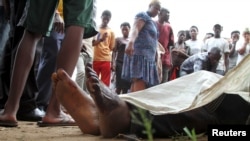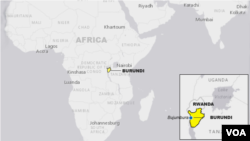Fears are growing that the rising ethnic divide in Burundi is beginning to resemble the situation that preceded Rwanda’s 1994 genocide, which killed some 800,000 people, mainly Tutsis, by Hutus.
The United Nations human rights chief has spoken out against increasing violence in Burundi, where he warns "a complete breakdown of law and order is just around the corner."
Zeid Ra'ad Al Hussein warns that the crisis in Burundi is increasingly taking on an ethnic dimension. He says he has evidence women have been sexually violated by security forces because of their Tutsi ethnicity.
Al Hussein is clearly worried about emerging new trends in Burundi, including cases of sexual violence by security forces and a sharp increase in forced disappearances.
He released a statement Friday saying a series of raids Burundian security forces conducted on December 11 against opposition supporters' houses triggered human rights violations.
He said there were reports of gang-rapes of women during the raids and reports from locals that there were mass graves in the area.
Al Hussein says the reports set off "all alarm signals, including a dimension of growing ethnic crisis."
Burundi's army reported on December 12 that at least 87 people were killed in the capital, Bujumbura, by what it said were attacks on three military installations by unknown gunmen.
Eye witness accounts
But witnesses, who told reporters they emerged from hiding Saturday to find hundreds of corpses in the streets, said some of the victims had been dragged from their homes by security forces and executed. The army has declined to address those allegations.
The high commissioner’s spokesman, Rupert Colville, says the U.N. has documented 13 cases of sexual violence against women during search and arrest operations following the December events. He says new cases of sexual violence are continuing to emerge, noting victims of these operations say they were targeted because they were Tutsis.
“The suggestion that an ethnic dimension is now starting to emerge is reinforced by one of the sexually abused women who said that her abuser told her she was paying the price for being a Tutsi," Colville said. "Another witness claimed that Tutsis were systematically killed, while Hutus were spared.”
Colville says the U.N. Human Rights office also has received numerous allegations that many young men were picked up by police and army forces during this search operation. He says many were later tortured, killed, or taken to unknown destinations.
He says the high commissioner is particularly alarmed at the increasing number of disappearances, coupled with allegations of secret detention facilities and mass graves.
“Witnesses have reported the existence of at least nine mass graves in Bujumbura and its surroundings — including one in a military camp," Colville said. "And, together, they are believed to contain more than 100 bodies in total, all of them allegedly killed on the 11th of December.”
High Commissioner Al Hussein is calling for an urgent impartial investigation into the events on December 11 and 12, including the alleged mass graves. He says it is critical for these grave sites to be safeguarded.
U.N. Secretary-General Ban Ki-moon said Thursday he is deeply concerned about Burundi's instability and called on Burundi's leaders to take steps to build confidence, including releasing political prisoners and lifting restrictions on civil society.
State of crisis
Peace talks set to be held in Tanzania were canceled earlier this month when the Burundian government refused to participate in talks that include the political opposition, which it accuses of "supporting violence."
And last month, Burundi refused an offer by the African Union to send 5,000 peacekeepers to Burundi to stop the violence. The government said the AU troops could be attacked if they attempt to come without permission.
Burundi has been in crisis since late April when President Pierre Nkurunziza announced he would run for a third term in office, arguing that the constitution allows him to do so because he was appointed to his first term. The announcement set off political demonstrations that were met with violence by security forces.
Burundi's constitutional court ruled in the president's favor, and he won his third term in July elections boycotted by the opposition. The political turmoil has continued, and worsened, since then.






